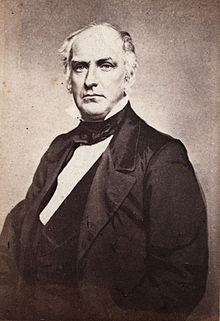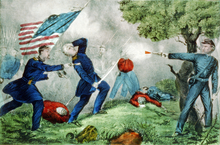Edward Dickinson Baker
Edward Dickinson Baker (born February 24, 1811 in London , England , † October 21, 1861 in Leesburg , Virginia ) was an American politician and officer in the US Army during the American Civil War .
Youth and political career
Baker was born the son of a teacher in London and came to Philadelphia with his family in 1816 . His parents were Quakers and in 1825 they joined the New Harmony colony in Indiana founded by the early socialist Robert Owen , which was abandoned in 1829. The family then moved on to Belleville , Illinois , where Baker married and practiced as a lawyer. In 1832 he took part in the Black Hawk War as a soldier . Baker soon became politically active and joined the Whig Party . From 1837 to 1844 he was a member of the House of Representatives and later of the Illinois Senate . In 1844 he became his party's candidate for a seat in the United States House of Representatives after defeating Abraham Lincoln in the nomination vote. Still, Baker and Lincoln, who would later succeed him in Congress, became close friends. Lincoln even went so far as to name his second son, who died early, after Edward Baker. Baker resigned from his Congressional mandate in early 1847 to serve as commander of the 4th Illinois Infantry Regiment in the Mexican-American War . He took part in the siege of Veracruz and the battle of Cerro Gordo and was dismissed from service after the end of the war in 1847. From 1849 to 1851 Baker again represented Illinois in the US House of Representatives. However, disappointed that President Franklin Pierce did not accept him into his cabinet, he temporarily withdrew from politics and went to California to resume law practice in San Francisco . In 1860 he moved to Oregon and was representing the Republican Party in the United States Senate voted. In October he traveled to Washington, DC to take up his mandate there.
Death in civil war
Edward Baker set up the 1st California Infantry Regiment, with the approval of the Secretary of War, whose members were recruited in the Philadelphia area but counted towards the California quota. Baker himself was appointed commander of this regiment. During the late summer and fall of 1861, the regiment was under the command of the Potomac Army, under the command of Major General McClellan , which was deployed on the north bank of the Potomac . President Lincoln promoted his old friend to volunteer general ranks twice, first to brigadier general in August and then to major general a few weeks later. Baker turned down both appointments because if they were accepted he would have had to resign from his Congressional mandate. As the commander of a brigade in the division of Major General Charles Pomeroy Stone , Baker received on October 21, 1861 the order to undertake an advance across the Potomac to Virginia and to explore the area around the city of Leesburg. In a process that was as complicated as it was lengthy, Baker set his brigade across the river with the help of a few barges and, without a secure connection with the north bank, engaged in a skirmish with a large Confederate formation under Brigadier General Nathan G. "Shanks" Evans , which joined the battle Ball's bluff widened. During that battle, Baker was shot in the head. The brigade suffered a heavy defeat with far-reaching consequences.
Aftermath
The death of an incumbent US senator and personal friend of the president caused a stir in political Washington. The defeat at Balls Bluff was the third setback for the army in just three months after the disasters at Bull Run and Wilson's Creek . The radical Republicans in Congress, in particular, suspected sections of the army of treason, condoning slavery, and secret sympathy for the southern states, and pressed for an investigation into the incidents. At their demands, a "Joint Committee for Warfare" ( Congressional Joint Committee on the Conduct of the War ) was formed at the beginning of December 1861 , which set about looking for those to blame for the poor war situation with inquisitorial zeal. Especially officers belonging to the Democratic Party were the victims of this witch hunt. Though Baker's decisions were responsible for the defeat at Balls Bluff, his boss Stone was scapegoated for the affair, arrested in the dark and jailed for six months without charge.
Web links
- Edward Dickinson Baker in the Biographical Directory of the United States Congress (English)
- Edward Dickinson Baker in the database of Find a Grave (English)
| personal data | |
|---|---|
| SURNAME | Baker, Edward Dickinson |
| BRIEF DESCRIPTION | American politician |
| DATE OF BIRTH | February 24, 1811 |
| PLACE OF BIRTH | London , England |
| DATE OF DEATH | October 21, 1861 |
| Place of death | near Leesburg , Virginia |


